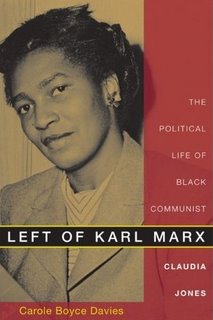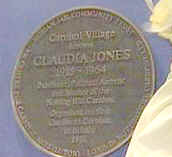 LEFT OF KARL MARX by DR. CAROLE BOYCE-DAVIES LEFT OF KARL MARX by DR. CAROLE BOYCE-DAVIES
Claudia Cumberbatch Jones (1915-1964) Do you know that this black woman is buried to the left of Karl Marx? Do you know that this Trinidadian woman founded the London Carnival? Do you know that this woman started the first black newspaper in London? |
CBD Introduction Speech |
||
|
|
Blue Historical Marker |
||

Carole, Claudia's lovely face will appear on UK postage stamps from now on. I will send you a letter using the 72p stamp soon as I get to the Post Office. Hope all is well with you and yours and that this link works so you can see the Claudia Jones stamp. We are all following the election campaign with great trepidation. Fingers crossed. Diane Langford Tuesday October 14 2008 Royal Mail stamps, Women of Distinction Royal Mail stamps, Women of Distinction. Photograph: Royal Mail/PA Wire Six formidable women, from a pioneering campaigner for women's votes to Labour's "Red Queen", the late Barbara Castle, will be honoured today in a set of special stamps from Royal Mail. When the issue, the first devoted to women, was announced, there were objections to the inclusion of Marie Stopes, author of Married Love in 1918, the first cheap book to inform women in plain language about family planning, and founder of the first free family planning clinic in 1921. Anti-abortion organizations and feminists condemned the choice of a woman whose opinions - especially on eugenics - became increasingly eccentric in later life. However, the Marie Stopes charity responded: "Controversy she may have courted, but it is difficult not to be astounded by Marie Stopes' achievements." Claudia Jones, a less familiar name, was a journalist, socialist and campaigner for black rights who helped to launch the Notting Hill carnival in 1959 as a showcase for local African-Caribbean culture and talent. The stamps also honour two sisters: Millicent Garrett Fawcett, who became president of the National Women's Suffrage Societies, and her elder sister, Elizabeth Garrett Anderson, the first British woman to qualify as a doctor. The set includes two politicians: Eleanor Rathbone, a campaigner for social reform who was elected an MP in 1929 and was a major player in the introduction of family allowances (now known as child benefit); and Barbara Castle, the former cabinet minister who died six years ago at the age of 92. As transport minister under Harold Wilson, she was the fourth woman to enter cabinet. As Lady Castle of Blackburn she continued to harangue Labour conferences, latterly on pension reform, right to the end of her life.
|
Looking for Claudia Jones trailer
NUJ Claudia Jones Memorial Lecture 2008 Claudia Jones Memorial Lecture
| ||
|
Plaques honour carnival founder The founder of the Notting Hill Carnival has been honoured in central London at a ceremony in which two commemorative plaques were unveiled. Fifty years ago the late activist Claudia Jones organised Britain's first event celebrating Caribbean culture. It grew into a street party which in 1964 became the west London carnival. John S Jeremy, High Commissioner for Trinidad, was among those at the unveiling of blue and bronze plaques at Portobello Road and Powis Square. Known as the "mother of the Notting Hill Carnival", Ms Jones was born in Trinidad in 1915 but spent most of her adult life in the US. Celebratory walk In 1955 she was deported from the US for "un-American" activities and given asylum in Britain, where she founded and edited the West Indian Gazette, Britain's first black weekly newspaper. Following the 1958 riots in Notting Hill, she organised a walk from Powis Square to Tavistock Square to celebrate positive aspects of Caribbean culture. A few months later Ms Jones organised Britain's first Caribbean carnival, held indoors at a hall in St Pancras. This continued annually until Claudia and friends established the first carnival on the streets of Notting Hill. This year's Notting Hill Carnival is expected to attract 1.5 million people to west London from Saturday. Jak Beula, founder of the Black history organisation Nubian Jak Community Trust, said: "It is wonderful that someone who gave so much to her community, and who stood up for justice and equality, should finally be recognised for giving Britain its greatest symbol of cultural diversity - The Notting Hill Carnival." Allyson Williams, interim chair of London Notting Hill Carnival Ltd, hoped the plaques would "remind us all of the sacrifices that others have made, so that today we can enjoy the freedoms of a truly multicultural Britain". |

|
||
| ©2009 Carole Boyce-Davies |
 Born
in Trinidad, Claudia Jones is a Marxist
and feminist, as well as the subject of a recent biography by
Caribbean scholar Carole Boyce Davies, titled Left of Karl Marx:
The Political Life of Black Communist Claudia Jones. The title
refers to the fact that she was buried "to the left" of Marx
in London's Highgate cemetery; we may also think about how this is also an accurate
ideological portrayal of the radical activist, writer, and community
advocate.
Jones migrated to New York in 1924, where she was active in the
Communist Party and wrote journalistic articles and poetry, mobilized,
and traveled the lecture circuit. In the 1950s, she was renowned for
the column "Half the World" for the Daily Worker newspaper.
During this era of McCarthyism, Jones was constantly arrested, spent
nearly a year in prison, and was then deported. However, she received
political asylum in Great Britain, where she continued her political
organizing. One of her legacies in London was her work with the West
Indian community there, where she founded a Caribbean festival, now
known to the world as the
Born
in Trinidad, Claudia Jones is a Marxist
and feminist, as well as the subject of a recent biography by
Caribbean scholar Carole Boyce Davies, titled Left of Karl Marx:
The Political Life of Black Communist Claudia Jones. The title
refers to the fact that she was buried "to the left" of Marx
in London's Highgate cemetery; we may also think about how this is also an accurate
ideological portrayal of the radical activist, writer, and community
advocate.
Jones migrated to New York in 1924, where she was active in the
Communist Party and wrote journalistic articles and poetry, mobilized,
and traveled the lecture circuit. In the 1950s, she was renowned for
the column "Half the World" for the Daily Worker newspaper.
During this era of McCarthyism, Jones was constantly arrested, spent
nearly a year in prison, and was then deported. However, she received
political asylum in Great Britain, where she continued her political
organizing. One of her legacies in London was her work with the West
Indian community there, where she founded a Caribbean festival, now
known to the world as the 


